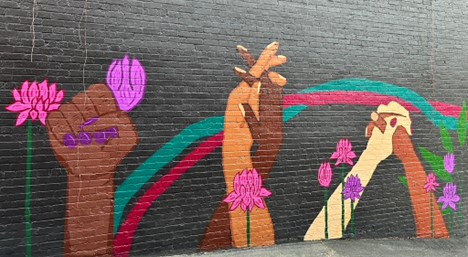On February 18, 2019, the Latinx Student Caucus and Social Justice Action Committee hosted a panel and teach-in on immigration and detention, coving topics ranging from the history of Immigration and Customs Enforcement (ICE) to a personal account of what it is like to be detained. After the panel, the speakers and participants shared a meal from So Good Pupusas and had conversations about the topic, including strategies for action.
Raul Pinto, Senior Staff Attorney with Immigrants and Refugees Rights Project of the North Carolina Justice Center, opened the teach-in with a history of the development on ICE and the policies that drive their work. In addition to the history of ICE as a function of the Justice Department in the 1990’s to Homeland Security post 9/11, Raul shared a detailed explanation of 287-G, an ICE initiative allowing local law enforcement to partner with ICE to arrest and detain undocumented immigrants, even without having engaged in criminal activity.
Viridiana Martinez, DACA recipient and Immigrant Youth Organizer, passionately discussed the steps someone should take if they suspect someone has been detained. Viridiana provided the website to the ICE Detainee Locator https://locator.ice.gov/odls/#/index urging listeners to enter the full name and date of birth of the person who is suspected of being detained, and reminded attendees that variations of a last name might be documented in many ways (i.e. Martinez-Gonzalez, Martinez Gonzalez), and so individuals looking for someone should keep this in mind. Viridiana also provided context on 287-G, and laid out the various locations a detainee can be sent throughout the south east.
Victoria Romero, M.Ed. and Program Manager for Case Management Services and Outpatient Therapist at El Futuro, Inc. in Durham, NC, facilitated a discussion on the impact of stress and trauma for children and families separated at the border. Victoria talked about the trauma a child likely faces before the journey to the border and the importance of child/parent attachment as a buffer to stress. For children and families journeying to the states, migrating is often times safer than remaining in home country, but when children are separated from parents at the border, a child’s buffer is removed and makes a child vulnerable to extreme levels of stress and trauma. Victoria urged social workers and educators working with this population to support children by connecting their feelings to their behaviors.
Ricardo Garcia Lopez, a volunteer for Alerta Migratoria ended the teach-in by sharing his own personal experience being detained by ICE, of nearly 10 months. Ricardo’s story effectively captured the attention of the room as he explained that since arriving to America as a twelve-year-old child, this is the only home that he knows. Ricardo’s story was an example of how aggressive policing on this population has impacted undocumented immigrants and their families. It was also a story of a great love for the U.S. and what it offers, as he said, “It’s a great country. It’s a country of opportunity. You can be whoever you want to be here. This is my home.”
During the panel, speakers urged participants to reach out to policy makers rather than taking a position of passivity on the matter. Panelists talked about the importance of having local officials hear from people who have been impacted by the policies enforced by ICE, and push for change.
As Viridiana highlighted, this issue impacts families in North Carolina every day. It is time to “get off the sidelines” and lean in for change. The full teach-in can be viewed here: https://vimeo.com/318358833/8a4092fe54.
